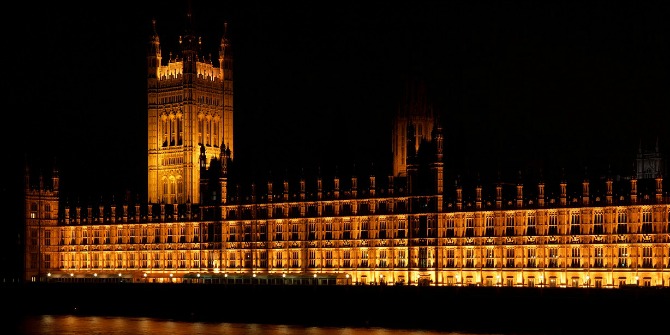

 Helen Penn, Antonia Simon, and Eva Lloyd explain why nurseries are struggling to cope with the costs of the ongoing pandemic. They write that, as in many other areas, the crisis highlights the effects of years of austerity on the sector.
Helen Penn, Antonia Simon, and Eva Lloyd explain why nurseries are struggling to cope with the costs of the ongoing pandemic. They write that, as in many other areas, the crisis highlights the effects of years of austerity on the sector.
As a result of the Covid-19 pandemic, all nurseries, like schools, have been ordered to shut. They can only stay open to admit vulnerable children or children of key workers. The problem is that the UK has many kinds of nursery and childcare provision, funded and delivered in different ways. So the impact of this measure on children, parents, and staff, will vary according to the type of nursery. In particular, if the nursery is run as a business, there are very real threats of permanent closure, if the nursery gets into debt.
Some early childhood care and education is provided by state schools, but most is provided by private day nurseries. Nursery education is free to parents in state nursery classes which are attached to schools or in freestanding state nursery schools. Staff in state nurseries are employees and will get paid by the local authority, whether or not their place of work is open. Like schools, state nursery provision will be able to re-open after the crisis is over.
But state nursery classes and nursery schools are mostly part-time, and do not take children under the age of three. So, parents who are working frequently use private day nurseries, for which they must pay a weekly fee, which may be as high as £80 per day. There are some government childcare subsidies towards this fee, both education and childcare subsidies, but the subsidies available rarely cover the cost of fees, because around 70% of private nurseries charge for extras over and above the government allowance.
Our ongoing research, funded by the Nuffield Foundation, is showing that there are many kinds of private nurseries. Around half of the private day nursery places available are provided by big financialised chains, who have had aggressive expansion plans to buy out and take over smaller nurseries, and at any given time, there are many such transactions in process. In addition, around 13% of the childcare market is international, foreign nursery chains either buying into the UK, or UK-based chains operating in other countries. So childcare is a volatile market with uncertain boundaries. Are foreign investors required to follow our rules? What happens to all those deals in the offing?
There are also considerable staffing issues in the private nursery sector. Around half of all employees in the big chains and many in smaller companies are on apprenticeship schemes, which have proved a cheap way of offering employment. It is not clear what employment status such apprentices have. Recent research suggests that many nursery staff are employed at less than the minimum wage, with minimal work-related benefits. Private nursery businesses, like other businesses, may try to access new government loan schemes, and take advantage of the offer to fund 80% of salary costs. But if staff salaries are already very low, or below the minimum wage, 80% of salary costs is in effect a starvation wage.
In this situation, nurseries in England are struggling to find strategies to recoup income. The website advice from the big companies changes almost daily. One particularly big chain, Just Childcare, on their website asked parents to continue paying fees even though the nurseries were shut, although they now appear to have retracted this, and their justification for asking for fees is no longer available online. Bright Horizons, another large chain, at first attempted to position itself as the go-to company to provide childcare for key workers but are now instead offering webinars on managing the crisis. Busy Bees, the largest chain, have sent out a stream of letters to parents, advising them about openings and other pandemic-related issues. So it is not clear whether those parents still using the nurseries will have to pay the standard fees, or whether those not using the nurseries will still have to pay retainers. In Australia, for instance, the government has just made childcare free for those that need it.
The smaller nurseries, either stand alone or with a handful of nurseries in the company, are also extremely vulnerable. Their profit margins were very small, especially those who catered for vulnerable children and who were reliant on government childcare subsidies without top-ups from parents. Before the coronavirus crisis, the sector made frequent requests for higher subsidy allowances, and the rate of closures had been increasing, especially in deprived areas. Imminent failure threatens those nurseries whose insurance does not cover the Covid-19 pandemic. It is not clear how, or if, small nurseries will weather the storm. The relevant Minister, Vicky Ford, has issued a letter to early years and childcare providers in England pointing out that they will be entitled to the same financial support as other small businesses, and that the educational entitlement they may receive for children two, three and over will continue. But it is unclear whether this also applies to the childcare subsidies for working parents who cease to attend the nurseries. The government previously offered about £5.6billion in total to support early years and childcare, but this total encompassed a variety of separate and often ill-coordinated funds, and it is also not clear how much of it will continue if parents are not using the nurseries. The Minister does however say that she will engage with representative organisations in the sector to discuss options.
The Covid-19 pandemic has meant that childcare is now much more visible to government and employers. It is being seen, as it wasn’t before, as an essential and integral part of the education and employment infrastructure. If many childcare businesses fail, this will have far-reaching consequences for economic recovery. The muddle and contradictions of the sector – the variations in access, the lack of coordination, the high costs, the poor wages and low levels of qualification, the inconsistent funding, and the lack of accountability – are being highlighted as never before. The early education and childcare system needs a complete overhaul. As in so many other areas, the pandemic has illustrated the effects of austerity and neglect over many years. Let’s hope we can learn from it.
__________________
 Helen Penn is Professor Emeritus at the University of East London and Visiting Professor at the Thomas Coram Research Unit, UCL Institute of Education.
Helen Penn is Professor Emeritus at the University of East London and Visiting Professor at the Thomas Coram Research Unit, UCL Institute of Education.
 Antonia Simon is programme lead for the MSc Systematic Reviews for Social Policy and Practice at UCL. She is currently leading a research project which aims to analyse the impact and reach of private sector childcare in England (funded by the Nuffield Foundation).
Antonia Simon is programme lead for the MSc Systematic Reviews for Social Policy and Practice at UCL. She is currently leading a research project which aims to analyse the impact and reach of private sector childcare in England (funded by the Nuffield Foundation).
 Eva Lloyd is Professor of Early Childhood Cass School of Education and Communities and Director International Centre for the Study of the Mixed Economy of Childcare at the University of East London.
Eva Lloyd is Professor of Early Childhood Cass School of Education and Communities and Director International Centre for the Study of the Mixed Economy of Childcare at the University of East London.
All articles posted on this blog give the views of the author(s), and not the position of LSE British Politics and Policy, nor of the London School of Economics and Political Science. Featured image credit: by Kristin Brown on Unsplash.








A very good article summarising the current position in the UK. What would be interesting is what next and how you would see the future post COVID-19.? I am also curious by the statement of low levels of qualification? Day nurseries in the UK were set up to enable working parents to work by providing a safe caring environment for children. The staffing was carers who wanted a vocational career. Over time this has become more educational so the push has been for better qualified staff which reduced supply, reduced college places, but, not one has told the parents they have to pay more as a result which then comes onto the point about high cost.
The model is quite simple? If Gov want nurseries to be high level educators then nurseries employ high calibre staff and charge more in fees. If Gov want nurseries to enable working parents to work and provided a basic level of education nurseries have greater staffing flexibility and then can deliver this at a lower cost. The funded hours is flawed and surely give the grant to the parents for them to choose how they spend it!